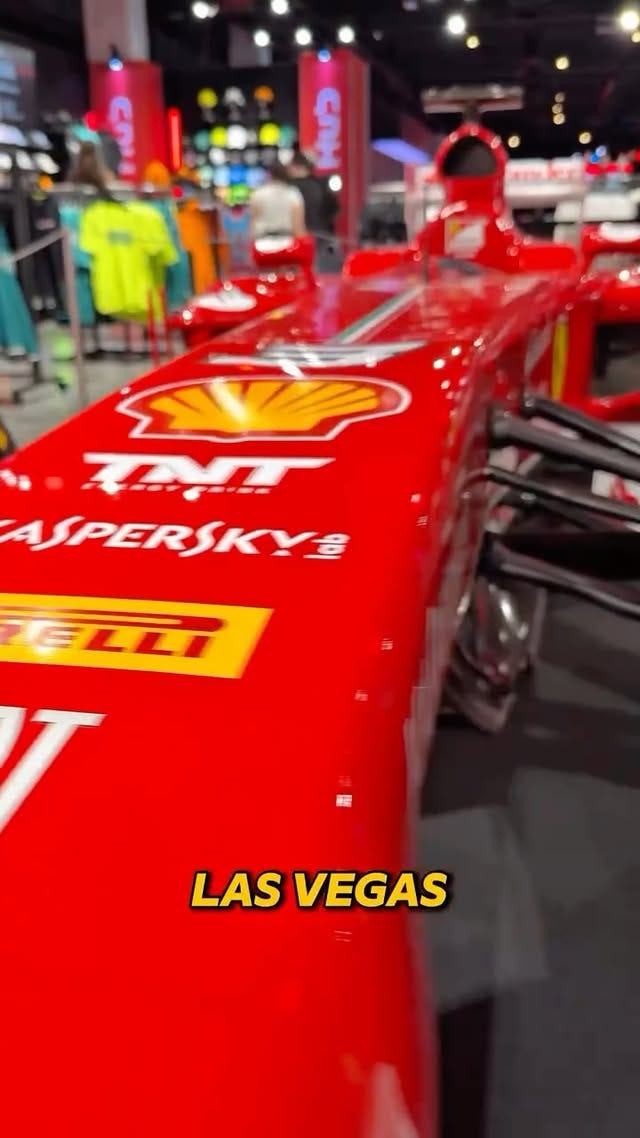How a Brad Pitt movie convinced Apple to spend $150M on racing
The rumored deal that reveals streaming wars' true cost
You are receiving this email because you subscribed to Business of Speed, the newsletter for those wanting to stay ahead on what’s happening behind the scenes. I’m Vincenzo Landino, a business, tech, and F1 commentator. I’ve spent the last ten years at the intersection of content, partnerships, and the business of motorsport. This newsletter is where I break down what’s working, what’s shifting, and what’s next without the PR gloss. Thank you for being here.
Apple has reportedly submitted a jaw-dropping $150 million annual bid to secure exclusive U.S. Formula 1 streaming rights starting in 2026.
It’s no surprise it comes after the Allen & Co. Conference: a meeting of America's media power brokers in Sun Valley, Idaho, every July. It’s the most exclusive networking event in business. Think of it as summer camp for billionaires, except instead of friendship bracelets, they're making deals worth hundreds of millions.
This year's gathering became the stage for one of sports media's most significant power plays. Liberty Media CEO Derek Chang found himself in meetings with some of the biggest names in tech and media: Apple's Tim Cook and Eddy Cue on one side, Disney's Bob Iger and ESPN's Jimmy Pitaro on the other. The prize? Formula 1's U.S. broadcast rights.
Here's where it gets interesting: ESPN currently pays around $90 million annually for F1 rights. However, Apple walked into those Sun Valley meetings reportedly willing to pay $150 million or more—a premium driven almost entirely by the F1 movie's explosive success. The Brad Pitt film has generated nearly $400 million at the box office in just two weeks, demonstrating that Apple's Hollywood gamble has been a success.
If this deal closes, F1 races will move to Apple TV+, which has roughly 45 million subscribers. That might sound small compared to Netflix's 81 million, but it’s nearly double ESPN's subscription base.
The streaming landscape tells the real story: 88% of U.S. households now have at least one streaming subscription, accounting for 45% of all TV usage. Cable (24%) and broadcast (20%) are fighting for what's left.
What makes the deal more complex is Formula 1's direct-to-consumer service, F1TV, which generates significant revenue in the U.S. Combined with ESPN's payments, F1's total U.S. media revenue is currently in the ballpark of $130 million annually.
Any streaming partner demanding exclusivity would want F1 TV eliminated from the equation. That means Apple's bid needs to exceed not just ESPN's offer, but the combined value of both revenue streams.
The Revenue vs. Reach Dilemma
Here's where this deal gets fascinating from a business perspective. ESPN isn't walking away because they can't afford it—they're walking away because the numbers don't add up. Disney's streaming giant is essentially choosing distribution reach over premium pricing, a calculated retreat that says more about Apple's strategic positioning than ESPN's financial limitations.
Consider the stark reality: Apple TV+ reaches only 11% of U.S. households, while ESPN is available in virtually every cable and streaming household in America. Apple is betting that exclusive, premium content can overcome this massive distribution disadvantage. This wager could either validate their "quality over quantity" approach or expose the limits of their streaming ambitions.
For Liberty Media, this decision represents the classic "revenue versus relevance" trade-off that has defined modern sports media negotiations. The F1 parent company is prioritizing immediate financial gains over long-term audience development, banking on Apple's ability to maintain and grow viewership despite significantly reduced accessibility.
This strategy mirrors Apple's approach with Major League Soccer, where they secured global rights for $250 million annually over 10 years. However, MLS has disappeared mainly from casual sports conversation since moving to Apple TV+, raising questions about whether short-term revenue gains justify potential long-term audience erosion.
The Technology Integration Play
Apple's bid isn't just about acquiring content—it's about creating an ecosystem. The company has already demonstrated innovative integration possibilities with their F1 film, including haptic feedback technology that allowed iPhone users to experience simulated racing sensations. This suggests that Apple views F1 as a testing ground for immersive viewing technologies, potentially including the integration of Apple Vision Pro and custom camera systems.
Unlike traditional broadcasters, who treat sports as programming, Apple views F1 as a technology showcase and a user acquisition tool. This fundamental difference in approach explains why they're willing to pay double ESPN's valuation—they're not just buying broadcast rights, they're investing in a premium content laboratory.
Industry Precedent
This deal also signals a broader shift in the economics of the sports media industry. Apple's willingness to dramatically overpay for F1 rights—relative to current viewership metrics—suggests tech companies are valuing sports content differently than traditional media companies. They're betting on growth potential and technological integration rather than immediate return on ad revenue.
The ripple effects extend beyond F1. ESPN now faces pressure to defend its remaining premium sports properties. In contrast, other racing series and niche sports may see inflated rights valuations as streaming platforms seek to differentiate their content.
Apple's most considerable risk lies in audience retention and growth. F1's unique scheduling challenges—with races often occurring during inconvenient U.S. time zones—make achieving growth in viewership particularly difficult. If Apple can't meaningfully expand the F1 audience, they'll have overpaid for a premium but limited asset.
However, the potential rewards are substantial. Success with F1 could position Apple as a serious competitor for other major sports rights, including NFL packages that become available in future negotiation cycles. More importantly, it validates Apple's premium content strategy and demonstrates its willingness to invest heavily in exclusive programming.
The Broader Streaming Wars Context
This deal represents Apple's most aggressive move yet in the streaming wars, signaling their intention to compete not just on original content but on live sports, traditionally the domain of traditional broadcasters and established streaming giants like Amazon and Netflix.
Apple's F1 gambit is ultimately a bet on the future of sports consumption: that premium, technology-enhanced experiences can overcome traditional distribution advantages. Whether that bet pays off will depend on their ability to innovate beyond conventional broadcasting and create genuinely differentiated viewing experiences.
The verdict? Apple is buying more than just F1 rights. They’re investing in the future of sports media.
If you enjoyed this breakdown, subscribe to Business of Speed for more on the business behind Formula 1 and motorsport. Let's connect the dots. And, if you're a brand eyeing motorsport or looking to get more out of your current motorsport partnership, let’s work together.
Latest News
Sergio Perez Set for Formula 1 Return With Cadillac in 2026
It is understood that the signing of Perez will be a financially lucrative one for both parties, with Mexican businessman Carlos Slim reportedly involved in the deal. Cadillac is expected to make Perez's signing official in the days following August's Hungarian GP. Read moreChristian Horner SACKED at Red Bull
In a seismic move for Formula 1, Red Bull parted ways with long-time Team Principal Christian Horner after nearly 20 years at the helm. The decision follows a period of internal turmoil and key senior staff departures. Read more
FIA Shakeup: Britain's Senate Rep Removed
FIA president Mohammed Ben Sulayem has removed the UK’s FIA senate representative, signaling an ongoing power struggle and shifting alliances within the motorsport governing body. Read the context
FIA Presidential Race: Tim Mayer vs. Ben Sulayem
Former FIA Chief Steward Tim Mayer is running for FIA President, challenging incumbent Mohammed Ben Sulayem in the upcoming election. This campaign is expected to focus on transparency and the direction of international motorsport. Latest from the FIA
New York Breaks U.S. SailGP Attendance Record as League Momentum Surges
More than 10,000 fans packed the Mubadala New York Sail Grand Prix, making it the most attended U.S. SailGP event ever. With record-setting TV viewership, a star-powered presence from DJ Khaled, and social engagement soaring across platforms, SailGP’s U.S. swing is cementing the league’s place among global sports heavyweights—and the action returns to New York again in 2026.
Read moreLiberty Media Acquires MotoGP
Liberty Media, the owner of F1, has finalized its acquisition of MotoGP, bringing the world’s top motorcycle series and Formula 1 under the same corporate umbrella. Read more
McLaren Fails to Sell Formula E Team
Despite a months-long search, McLaren has not found a buyer for its Formula E squad, raising questions about its long-term future in the electric racing series. Full story
Ferrari Renews Antonio Giovinazzi’s Endurance Deal
Ferrari has extended Antonio Giovinazzi’s contract in their endurance racing team, recognizing his key role in the marque’s successes in events like Le Mans and the WEC. Read announcement
Felipe Drugovich Makes Formula E Debut with Mahindra
Brazilian driver and F2 champion Felipe Drugovich will debut in Formula E for Mahindra at the Berlin E-Prix, adding new energy and talent to the grid. Race preview
BMW and Rahal Letterman Lanigan Racing Split after 2025 IMSA Season
BMW and RLL Racing have announced their partnership will end after the 2025 IMSA season—an alliance that’s lasted over a decade in top-level North American racing. Read more
Gene Haas Drives VF-23 at Goodwood
Team owner Gene Haas took the wheel of his own VF-23 Formula 1 car at the iconic Goodwood Festival of Speed, marking a rare on-track appearance for the engineer-entrepreneur. See highlights
James Vowles and Rachel Rolph Welcome Second Child
Williams Team Principal James Vowles and partner Rachel Rolph celebrated the birth of their second child, marking a personal milestone for one of F1’s most likeable figures. Backstory
Cadillac and Keanu Reeves Team Up for 2026 Racing Docuseries
Cadillac is partnering with actor Keanu Reeves to produce a behind-the-scenes documentary, following the brand’s preparations for its highly anticipated racing debut in 2026. Learn more
Field Notes
I attended a screening of the F1 Movie with IWC and then jumped on a plane to Las Vegas after being invited to check out the Grand Prix Plaza.






